


W. Hamilton Barnum
(1878 – November 11, 1937) Cleveland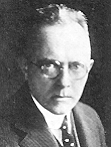
Barnum was a popular and admired figure in national philately and in the Cleveland area. He became a collector in 1890 at age 12, joined Cleveland's Garfield-Perry Stamp Club in 1895 and served as its president in 1902.
“Ham”
joined the American Philatelic Association (now the APS) in 1894.
From the start he was an active member, serving in many positions,
including the Board of Vice-Presidents in 1923-1924. He also participated
in the activities of the Philatelic Sons of America in the 1890s
when it attracted young collectors to its ranks and for a time was
the largest stamp club in the United States. Barnum attended nearly
every APA/APS and PSA convention from 1895 until his death and played
an active role in the evolution and growth of philately in this
country.
Return
to Top
Walter J. Conrath
(January 20, 1907 – May 7, 1942) Pennsylvania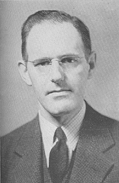
Conrath was one of the most influential aerophilatelists of his time. A pioneer member and president (1936-1938) of the American Air Mail Society, he also belonged to several other air mail collector clubs and was a tireless promoter of aerophilately.
Conrath both edited
and published The Airpost Journal and the American
Air Mail Catalogue and its supplements from 1934 to 1942. In
1940 he wrote, Mail Through the Air: A Review of the Development
of Air Mail and Aero-Philately which remained in print for many
years and was distributed by the AAMS. He died in an auto accident
at age 35.
Return
to Top
Eveleen Mary Weldon Severn
(1882 – March 3, 1942) Chicago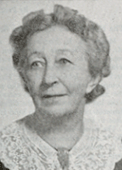
Eveleen Severn was an important figure in the advance and recognition of women in philately in the United States. From 1929 until her death she was president, associate editor and finally editor of Mekeel's Weekly Stamp News. In that prestigious position she promoted stamp collecting and the active role of women in philately.
Before 1930, very few women took active parts in, or even belonged to, stamp clubs. Many clubs openly discouraged their membership. On May 13, 1930, the first stamp club catering exclusively to women was organized. It was the Chicago Woman's Stamp Club, and Severn was a founder and its first president. In her honor, the club meeting room was named the “Severn Philatelic Room.” She was the first woman to become a member of the Chicago Philatelic Society.
Eveleen Severn served on several APS Committees. She was a member of the first committee to present the Luff Award (1940). At the 1940 APS convention, she recommended that the APS establish a Hall of Fame to honor deceased philatelists who had made outstanding contributions to philately.
In 1929, upon the death of her husband Charles, Eveleen Severn became president of Severn-Wylie-Jewett Co., Mekeel's Weekly Stamp News owners. During the years that Charles had been Mekeel's editor, the two of them had collaborated in both writing and editing. In September 1940, when Willard O. Wylie retired, she became the paper's editor and continued in that position until her death.

Eugene Klein
(June 26, 1878 – April 30, 1944) Philadelphia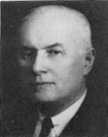
Klein was an internationally known dealer, auctioneer, collector and writer. His book United States Waterway Packetmarks: Handstamped and Printed Names of Mail-Carrying Steamboats on the United States of America Inland and Coastal Waters, 1832-1899, published in 1940, with a supplement in 1942, was a seminal work in a highly collected area. He was also a specialist collector of Heligoland, South Bulgaria and several South American countries.
Klein was the official expert of the APS (1911-1931), its International Secretary (1928-1935), President (1935-1937) and International Secretary again from 1937 until his death. Klein and James Waldo Fawcett are credited with proposing the formation of the American Philatelic Congress in 1935. They modelled it after the Philatelic Congress of Great Britain, whose convention they had recently attended.
Klein was a well-known dealer and auctioneer, holding his first auction in 1911 as Eugene Klein, Inc. After holding 24 sales, he established his own company, Eugene Klein, in 1914. Between 1914 and 1947 the firm held 184 additional auctions. Among the famous collections he sold were those of Henry Gibson, Eugene Bandholtz and Wharton Sinkler. Klein also sold the famous collection of Joseph Steinmetz in seven parts from 1929-1931.
Klein is remembered as the dealer who bought the sheet of the 24-cent "inverted Jenny" air mail stamps (Scott #C3a) from the finder, William T. Robey. He then sold the full sheet to Col. E.H.R. Green, who gave Klein permission to break up the sheet and sell some copies to other collectors.
Klein was an international juror and attended nearly every international philatelic exhibition from 1913 until his death.

Charles Foster Richards
(July 9, 1866 – November 29, 1944) New York City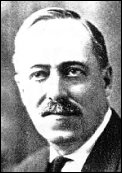
Richards was a noted specialist in the postage and revenue stamps and the postal stationery of Hawaii. His book, A Check List of the Stamps of Hawaii - and More (1916), was the book of record of its time. Richards published a brief “addition to” it in 1938. He contributed a paper, “Hawaiian Stamped Envelopes”, to Mekeel's Handbook No. 10, “Postage Stamps and Stationery of the Hawaiian Islands” (1916). (This volume also has papers by John N. Luff and Clifton A. Howes.)
Richards was a
charter member of the American Philatelic Association (now the APS).
He actively campaigned to have all counterfeit and repaired stamps
permanently marked as such by expert committees, and led the effort
by the APA to carry out this controversial program.
Return
to Top
President Franklin Delano Roosevelt
(January 30, 1882 – April 12, 1945) New York, Washington, D.C.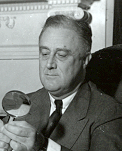
President Roosevelt was called the “Philatelic President.” During his presidency from 1933 to 1945 he promoted stamp collecting in many ways. Roosevelt had a hand in every stamp issued during his period in office, suggesting some, designing many and giving his final approval on all issues. He arranged for the issuance of souvenir sheets at national stamp conventions and saw that many stamps had their first days at philatelic events.
FDR, a stamp collector from his youth, joined the APS while he was governor of New York. During his presidency, he regretfully declined invitations to attend any local, national or international philatelic events. However, he always sent an enthusiastic and knowledgable reply, regretting his inability to attend but wishing he could.
His stamp collection contained an exceptional array of die proofs of 20th century U.S. stamps given to him by the Bureau of Engraving and Printing. It also contained full sheets of the stamps issued during his presidency, signed by post office officials and members of the BEP. His collection included many large and elaborate presentation albums containing unlisted varieties, proofs and essays given him as head of state by many foreign governments.
Roosevelt's philatelic collections were offered at a series of four auctions by H.R Harmer, Inc., in New York City in 1946. The proof section was described by Clarence W. Brazer. It brought sensational prices. The autographed sheets likewise sold at unexpectedly high prices. The presentation albums also caused a sensation, selling for prices far beyond their estimated philatelic values.
The items from
what might be called his “regular collection” consisting
of a diverse group of U.S. and foreign stamps and covers, also sold
out of proportion to their normal philatelic value. Collectors wanted
to own an “ex-Roosevelt” item. What was most astonishing
were the prices paid for bulk lots of ordinary, first day and souvenir
covers addressed to him from stamp clubs, exhibitions and private
collectors. Those lots were broken up, handstamped “From the
Franklin D. Roosevelt Collection,” and sold individually to
eager collectors.
Return
to Top
Willard Otis Wylie
(December 25, 1862 – November 30, 1944) Boston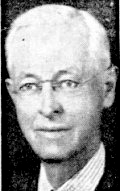
Wylie was a famous writer and editor. His career began in the 1890s as Boston editor for Mekeel's Weekly Stamp News. In 1898, I.A. Mekeel and Charles Severn invited him to join the Mekeel's Corporation. His first assignment, in late 1903, was to become editor of the Weekly Philatelic Era, a rival to Mekeel's run by W.W. Jewett, which Mekeel's had recently purchased. A few months later (March 1904) it merged with Mekeel's Weekly Stamp News.
When I.A. Mekeel died in 1913, the partnership of Severn-Wylie-Jewett purchased Mekeel's. Severn was corporate president and continued as editor of Mekeel's. Wylie was corporate vice-president and managing editor of Mekeel's.
In this position, he was in charge of the selection and publication of Mekeel's Handbooks, a series of monographs on a variety of philatelic subjects. Between 1912 and 1930 about 50 handbooks were published, many reprints from serial articles in Mekeel's. Wylie's selection of subjects and authors made the series a great success. Among the important writers who contributed to the series were Hall of Fame members B.W.H. Poole with over a doze publications, Fred J. Melville (4), J.M. Bartels (2), and Elliot Perry (3 including one under his pseudonym "Christopher West"). Wylie and Poole co-authored The Standard Philatelic Dictionary (1922).
Wylie continued as editor of Mekeels until September 1940 when Eveleen Severn became editor at the time the offices were moved from Boston to Portland, Maine. Wylie became Editor Emeritus.
Return to top of page



